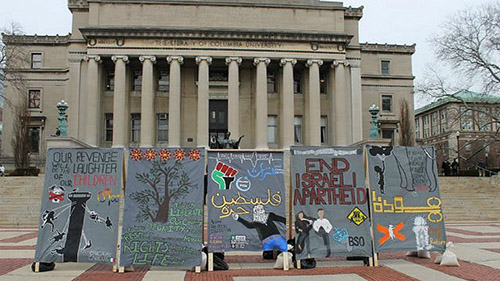

The U.S. Department of Education’s Office for Civil Rights (OCR) recently delivered welcome news for Jewish students. OCR reopened a student-backed civil-rights case brought by the Zionist Organization of America (ZOA) against Rutgers University.
Importantly, in deciding to reassess whether Jewish students at Rutgers were harassed and discriminated against in violation of Title VI of the Civil Rights Act, OCR stated that it will be using the U.S. State Department’s definition of anti-Semitism. This definition accurately recognizes the many ways in which anti-Semitism is expressed today, including when Jew-hatred is camouflaged as vicious criticism of Israel and the denial of the Jewish people’s right to self-determination.
OCR’s decision was sorely needed. In 2004, when Kenneth Marcus headed OCR, the agency finally afforded legal protection to religious groups that face discrimination based on their actual or perceived ancestry or ethnicity. The new policy not only benefited Jewish students; it also afforded Title VI protections for Sikhs and Muslims.
When Marcus left OCR, the agency retreated from its Title VI policy protecting Jewish students. After a six-year battle led by the ZOA—backed by bipartisan congressional support garnered by ZOA—in 2010, OCR re-affirmed that Jewish students would be protected under the law. But the policy was never adequately enforced, particularly when a Title VI complaint alleged anti-Semitism expressed as anti-Israelism or anti-Zionism.
The ZOA’s Title VI action against the University of California, Irvine—the first case of campus anti-Semitism that OCR ever agreed to investigate under Title VI—is a case in point. The evidence was horrifying: Jewish students, who came to learn and experience a fulfilling college life, were physically threatened and physically assaulted. A campus Holocaust memorial was vandalized. Posters proclaimed that “Zionism is Nazism” and equated the Star of David with the swastika. A huge sign on the university’s main walkway said “Israelis Love to Kill Innocent Children.” Speakers at podiums deliberately situated in the center of the campus regularly vilified Jews and Israel, comparing Jews to Satan and referring to them as “the new Nazis.”
Students courageously came forward in OCR’s investigation and described feeling afraid to openly identify as Jews and Israel supporters. Some feared for their physical safety. Two told OCR that they left Irvine and transferred to other schools because they could no longer endure the hostility.
Students also described how they tried to get university officials to address the problems to no avail. When a student wrote to numerous officials imploring them to protect her, only one administrator responded. He actually suggested that the student visit the counseling center, as if she were the problem.
Given the evidence, it’s almost impossible to understand how OCR could fail to find a Title VI violation. But that’s what happened. Almost nine years after the ZOA filed its complaint, OCR dismissed the case.
The ZOA’s case against Rutgers, recently highlighted in the media, is another example of how inadequately OCR responded to a Title VI complaint involving Israel. Among the claims was that Jewish students were discriminated against at an anti-Israel and anti-Semitic campus event, which was advertised as “free and open to the public.” When the event organizers saw how many “Zionists” (meaning Jews) showed up, they imposed and selectively enforced an admission fee against students perceived to be Jewish. Numerous witnesses attested to the discrimination. An email from a student volunteer at the anti-Israel event corroborated it, stating, “We need to start charging because 150 Zionists just showed up!”
Yet the case languished at OCR for seven years until Kenneth Marcus assumed the helm at OCR. Marcus reopened the case with a commitment to assess the evidence by using an appropriate and widely used definition of anti-Semitism.
The definition has been adopted by 31 countries around the world. The State Department is currently using it to assess how anti-Semitism is expressed globally. Even before the current definition, the State Department used largely the same one for many years, understanding that Israel-bashing and anti-Zionism can sometimes be a mask for anti-Semitism.
It makes sense for OCR to use the definition, too. It will provide critical guidance that the agency has lacked to this point, regarding how anti-Semitism is expressed today, including on college campuses.
Critics claim that using this definition will stifle free speech and make criticism of Israel illegal. Nonsense. OCR will and must continue to enforce Title VI consistent with the First Amendment. Also, the legal standards that OCR applies in deciding Title VI cases will not change. Hate groups like Students for Justice in Palestine will still be free to criticize Israel.
Critics also minimize the problem of campus anti-Semitism. But numerous studies document how prevalent the problem is, including a 2015 study by Brandeis University. In a 2016 follow-up report, Brandeis identified several “hot spots”—campuses where anti-Semitism and anti-Israel sentiment are particularly acute. Rutgers and many University of California campuses were among them.
OCR’s decision in the ZOA’s case against Rutgers is thus an important and promising development. With an accurate and widely used definition of anti-Semitism as a helpful guide, OCR should finally live up to its mandate to protect Jewish students from harassment and discrimination. Universities will get the message that they can no longer tolerate and must respond to anti-Semitism with the vigor they show when other groups are targeted. And Jewish students should finally be afforded the learning environment they are legally entitled to and that every student deserves.
By Susan B. Tuchman and Morton Klein/JNS.org
Susan B. Tuchman is the director of the Zionist Organization of America’s Center for Law and Justice. Morton Klein is the national president of the Zionist Organization of America.













